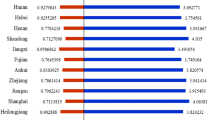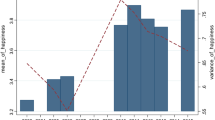Abstract
An influential stream of happiness literature has demonstrated that increased income did not raise individual happiness. Focusing on the case of Chinese society, this research aims to provide some preliminary accounts for the paradoxical observation that economic miracle in the country was not accompanied by more happiness. To this objective, our analysis starts with an investigation of the determinants of happiness in China, where a series of variables, measured both at individual and contextual levels, is incorporated to see the extent to which they explain the variance of personal happiness. Based on the findings derived from the multilevel statistical modeling, the research then moved forward to explore whether they have a clue for the happiness-income paradox in China. In particular, the research finds that social comparison and hedonic adaptation could be potential reasons for the happiness-income paradox in China. Furthermore, the empirical analysis provides novel clues on the ‘China puzzle’ by identifying the potential role of the adverse trends in other variables beyond income, which involves expanding social capital deficit, growing social inequality, and work-life imbalance.


Similar content being viewed by others
Notes
In the article, despite nuanced conceptual difference, happiness, subjective well-being and life satisfaction are used interchangeably to refer to the degree to which an individual evaluates the quality of his or her life favorably.
The survey also reported that overwork has been accompanied by a lack of paid leave for workers, with the amount of vacation time of the Chinese people falls considerably behind the world average.
Since the average percentage of missing data for most variables is around 6 % (less serious in the CCSY), with that of self-reported income and expected income registered a bit higher. Nevertheless, the situation became worse when both sources of data were merged, which led to nearly 20 % of missing data on a few variables. To alleviate this problem, the Provincial Statistical Yearbooks, Local Government Annual Reports and the National Economy and Social Development Statistics Bulletin were relied on to collect supplementary data for the missing values of those variables. For those that were still missing, EM imputation (Schafer and Graham 2002) was employed to predict the missing values for the respondents’ household income, individual income and expected income as well as the two indicators measuring environmental pollution, namely, the emissions of SO2 and industrial dusts.
In the regression analysis, the reference group was those who considered themselves to have a higher socio-economic position compared to their peers.
The divorce rate was calculated on the basis of the data published by the Ministry of Civil Affairs of the People’s Republic of China.
In the CGSS conducted in 2006 and 2008, the survey did not ask those living in rural areas about their working hours per week and therefore, to ensure data comparability, the medians of CGSS in 2003 and 2005 were calculated on the basis of the urban sample.
References
Appleton, S., & Song, L. (2008). Life satisfaction in urban China: Components and determinants. World Development, 36, 2325–2340.
Argyle, M. (1999). Causes and correlates of happiness. In D. Kahneman, E. Diener, & N. Schwarz (Eds.), Well-being: The foundations of hedonic psychology. New York: Russell Sage Foundation.
Bartolini, S., & Bilancini, E. (2010). If not only GDP, what else? Using relational goods to predict the trends of subjective well-being. International Review of Economics, 57, 199–213.
Bartolini, S., Bilancini, E., & Pugno, M. (2008). Did the decline in social capital depress Americans’ happiness? SSRN eLibrary.
Brickman, P., & Campbell, D. T. (1971). Hedonic relativism and planning the good society. In M. H. Appley (Ed.), Adaptation level theory: A symposium. New York: Academic Press.
Brockmann, H., Delhey, J., Welzel, C., & Yuan, H. (2009). The China puzzle: Falling happiness in a rising economy. Journal of Happiness Studies, 10, 387–405.
Chan, C. K., & Yao, X. (2008). Air pollution in mega cities in China. Atmospheric Environment, 42, 1–42.
Coleman, J. S. (1988). Social capital in the creation of human capital. American Journal of Sociology, 94, S95–S120.
Cramm, J., Møller, V., & Nieboer, A. (2012). Individual- and neighbourhood-level indicators of subjective well-being in a small and poor eastern cape township: The effect of health, social capital, marital status, and income. Social Indicators Research, 105, 581–593.
Di Tella, R., & MacCulloch, R. (2008). Gross national happiness as an answer to the Easterlin paradox? Journal of Development Economics, 86, 22–42.
Diener, E. (2012). New findings and future directions for subjective well-being research. American Psychologist, 67, 590–597.
Diener, E., Sandvik, E., Seidlitz, L., & Diener, M. (1993). The relationship between income and subjective well-being: Relative or absolute? Social Indicators Research, 28, 195–223.
Dolan, P., Peasgood, T., & White, M. (2008). Do we really know what makes us happy? A review of the economic literature on the factors associated with subjective well-being. Journal of Economic Psychology, 29, 94–122.
Easterlin, R. (1974). Does economic growth improve the human lot? Some empirical evidence. In P. A. David & M. W. Reder (Ed.), Nations and household in economic growth: Essays in honnour of Moses. New York and London: Academic Press.
Easterlin, R. A. (1995). Will raising the incomes of all increase the happiness of all? Journal of Economic Behavior and Organization, 27, 35–47.
Easterlin, R. A. (2003). Explaining happiness. Proceedings of the National Academy of Sciences, 100, 11176–11183.
Easterlin, R. A. (2009). Lost in transition: Life satisfaction on the road to capitalism. Journal of Economic Behavior and Organization, 71, 130–145.
Easterlin, R., McVey, L. A., Switek, M., Sawangfa, O., & Zweig, J. S. (2010). The happiness–income paradox revisited. Proceedings of the National Academy of Sciences, 107, 22463–22468.
Easterlin, R. A, Morgan, R., Switek, M., & Wang, F. (2012) China’s life satisfaction, 1990–2010. Proceedings of the National Academy of Sciences, 109, 9775–9780.
Ferrer-i-Carbonell, A., & Frijters, P. (2004). How important is methodology for the estimates of the determinants of happiness? The Economic Journal, 114, 641–659.
Frey, B. S., & Stutzer, A. (2002). Happiness and economics : How the economy and institutions affect human well-being. Princeton: Princeton University Press.
Graham, C., & Pettinato, S. (2002). Frustrated achievers: Winners, losers and subjective well-being in new market economies. Journal of Development Studies, 38, 100–140.
Helliwell, J. F. (2003). How’s life? Combining individual and national variables to explain subjective well-being. Economic Modelling, 20, 331–360.
Helliwell, J. F. (2006). Well-being, social capital and public policy: What’s new? The Economic Journal, 116, C34–C45.
Helliwell, J. F., & Huang, H. (2008). How’s your government? International evidence linking good government and well-being. British Journal of Political Science, 38, 595–619.
Helliwell, J. F., & Putnam, R. D. (2004). The social context of well–being. Philosophical Transactions of the Royal Society of London Series B Biological Sciences, 359, 1435–1446.
Hox, J. J. (1995). Applied multilevel analysis. Amsterdam: TT-Publikaties.
Hox, J. J. (2002). Multilevel modeling: When and why. In K. Jajuga, A. Sokolowski, & H.-H. Bock (Eds.), Classification, clustering, and data analysis: Recent advances and applications. New York: Springer.
Inglehart, R., Foa, R., Peterson, C., & Welzel, C. (2008). Development, freedom, and rising happiness: A global perspective (1981–2007). Perspectives on Psychological Science, 3, 264–285.
Inglehart, R., & Klingemann, H.-D. (2000). Genes, culture, democracy, and happiness. In E. Diener & E. M. Suh (Eds.), Culture and subjective well-being (pp. 165–184). Cambridge: MIT Press.
Kahneman, D., & Deaton, A. (2010). High income improves evaluation of life but not emotional well-being. Proceedings of the National Academy of Sciences, 107, 16489–16493.
Kahneman, D., & Krueger, A. B. (2006). Developments in the measurement of subjective well-being. The Journal of Economic Perspectives, 20, 3–24.
Knight, J. (2014). Inequality in China: An overview. The World Bank Research Observer, 29, 1–19.
Knight, J., & Gunatilaka, R. (2010). Great expectations? The subjective well-being of rural-urban migrants in China. World Development, 38, 113–124.
Knight, J., Lina, S., & Gunatilaka, R. (2009). Subjective well-being and its determinants in rural China. China Economic Review, 20, 635–649.
Kreft, I., & de Leeuw, J. (1998). Introducing multilevel modeling. London: Sage.
Lai, D., Meng, D., Li, C., & Wang, Q. (2014). China labor market report 2014. Beijing: Labor Market Research Center.
Layard, R. (2005). Happiness: Lessons from a New Science. New York: Penguin Books.
Lee, S., McCann, D., & Messenger, J. C. (2007). Working time around the world: Trends in working hours, laws and policies in a global comparative perspective. New York: Routledge.
Leung, A., Kier, C., Fung, T., Fung, L., & Sproule, R. (2011). Searching for happiness: The importance of social capital. Journal of Happiness Studies, 12, 443–462.
Li, J., & Raine, J. W. (2014). The time trend of life satisfaction in China. Social Indicators Research, 116, 409–427.
Lu, L., & Hu, C. H. (2005). Personality, leisure experiences and happiness. Journal of Happiness Studies, 6, 325–342.
Lucas, R. E., Clark, A. E., Georgellis, Y., & Diener, E. (2003). Reexamining adaptation and the set point model of happiness: Reactions to changes in marital status. Journal of Personality and Social Psychology, 84, 527–539.
Luttmer, E. F. P. (2005). Neighbors as negatives: Relative earnings and well-being. The Quarterly Journal of Economics, 120, 963–1002.
Oishi, S., Kesebir, S., & Diener, E. (2011). Income inequality and happiness. Psychological Science, 22, 1095–1100.
Oswald, A. J. (1997). Happiness and economic performance. The Economic Journal, 107, 1815–1831.
Pouwels, B., Siegers, J., & Vlasblom, J. D. (2008). Income, working hours, and happiness. Economics Letters, 99, 72–74.
Putnam, R. D. (2000). Bowling alone: The collapse and revival of American community. New York, London: Simon and Schuster.
Rasbash, J., Steele, F., Browne, W. J., & Goldstein, H. (2009). A user’s guide to MLwiN, v2.10. Centre for multilevel modelling. Bristol: University of Bristol.
Schafer, J. L., & Graham, J. W. (2002). Missing data: Our view of the state of the art. Psychological Methods, 7, 147–177.
Smyth, R., Mishra, V., & Qian, X. (2008). The environment and well-being in urban China. Ecological Economics, 68, 547–555.
Veenhoven, R. (1984). Conditions of happiness. Lancaster: Reidel.
Welsch, H. (2006). Environment and happiness: Valuation of air pollution using life satisfaction data. Ecological Economics, 58, 801–813.
Wong, E. (2013). Survey in China shows a wide gap in income. In The New York Times.
WorldBank. (2007). Cost of pollution in China: Economic estimates of physical damages. Washington, DC: State Environmental Protection Administration, World Bank.
Xiaotong, F. (1992). From the soil: The foundations of Chinese society. Berkely: University of California Press.
Acknowledgments
This research was supported by a Marie Curie International Research Staff Exchange Scheme Fellowship within the 7th European Community Framework Programme (Grant No: PIRSES-GA-2012-318961).
Author information
Authors and Affiliations
Corresponding author
Appendix
Appendix
See Table 1.
Rights and permissions
About this article
Cite this article
Li, J. Why Economic Growth did not Translate into Increased Happiness: Preliminary Results of a Multilevel Modeling of Happiness in China. Soc Indic Res 128, 241–263 (2016). https://doi.org/10.1007/s11205-015-1028-0
Accepted:
Published:
Issue Date:
DOI: https://doi.org/10.1007/s11205-015-1028-0




